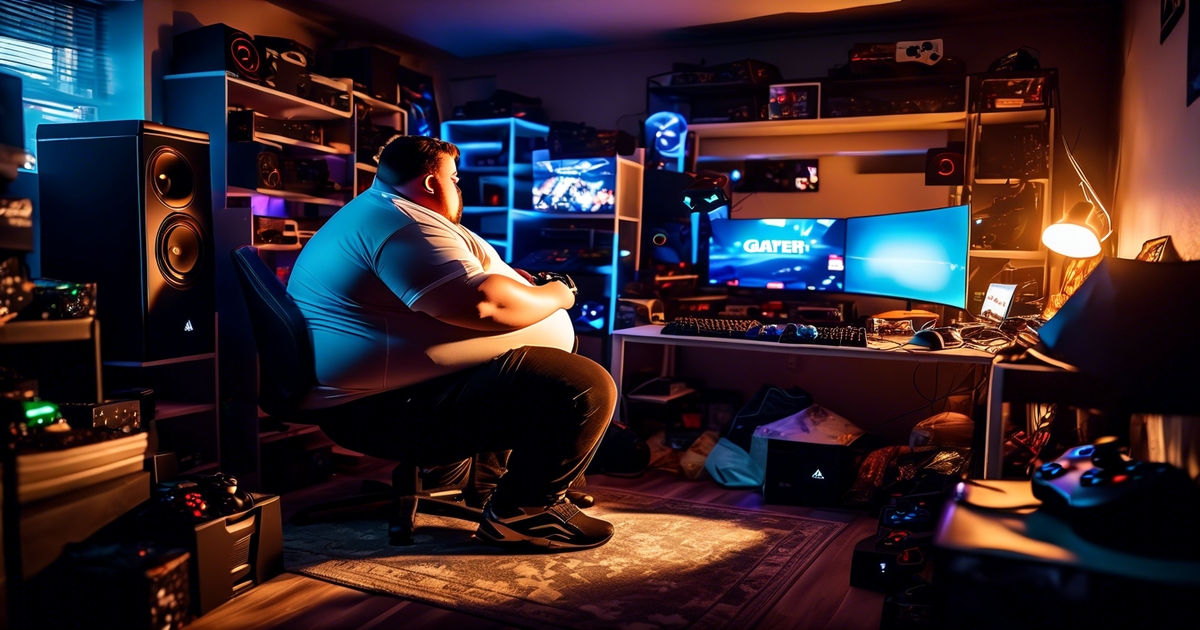10 Negative Effects of Video Games

- Key Takeaways
- 1. Increased Aggression
- 2. Social Isolation
- 3. Poor Academic Performance
- 4. Addiction Symptoms
- 5. Sleep Disturbances
- 6. Physical Health Decline
- 7. Impaired Attention Span
- 8. Increased Risk of Obesity
- 9. Exposure to Negative Behaviors
- 10. Financial Strain
- Conclusion
- Frequently Asked Questions
Ever wondered about the hidden impacts video games might have? From affecting sleep patterns and social skills to triggering aggression, the negative effects of gaming can be eye-opening.
But that’s not all; let’s dive deeper into how excessive screen time can impact mental health, physical well-being, and academic performance.
Key Takeaways
- Limit Screen Time: To reduce the negative effects of video games, consider limiting screen time and encouraging a healthy balance with other activities.
- Encourage Social Interaction: Encouraging social interactions and activities outside of gaming can help combat social isolation associated with excessive video game use.
- Monitor Academic Progress: Keep an eye on academic performance and intervene if video game use is negatively impacting school grades.
- Seek Professional Help: If addiction symptoms are present, seek professional help and support to address underlying issues and establish healthier habits.
- Establish a Bedtime Routine: Establishing a bedtime routine and limiting screen time before bed can help alleviate sleep disturbances caused by late-night gaming sessions.
- Promote Physical Activity: Encourage physical activity to counteract the physical health decline associated with prolonged sedentary gaming sessions.
1. Increased Aggression

Video games, particularly violent ones, have been associated with heightened levels of aggression. Research has consistently demonstrated a link between playing violent video games and increased aggressive tendencies. Exposure to such content can potentially fuel aggressive thoughts and behaviors in individuals.
Studies show a positive correlation between engaging in violent video games and the manifestation of aggression, especially in adolescents. This relationship is more pronounced among men who tend to exhibit greater susceptibility to the impact of these games on their behavior. The immersive nature of gaming experiences can sometimes blur the lines between virtual violence and real-life actions.
Excessive gaming, especially involving violent themes, may contribute to feelings of anger or hostility among players. It is crucial for parents and guardians to monitor the types of games their children are exposed to as part of managing potential negative repercussions related to increased aggression levels.
2. Social Isolation

Spending excessive time playing video games can lead to social isolation. Gamers may find themselves withdrawing from real-life social interactions as they prioritize gaming over spending time with friends and family. Online gaming, while providing a sense of community within the game world, often replaces genuine face-to-face interactions.
This pattern can result in decreased real-world socialization, impacting relationships and overall social functioning. When individuals immerse themselves in virtual worlds for extended periods, they may struggle to maintain healthy connections with others outside of the gaming environment. It’s essential to strike a balance between gaming activities and engaging in meaningful interactions with the people around you.
In extreme cases, prolonged isolation due to excessive gaming can have detrimental effects on mental health and well-being. Recognizing the importance of maintaining a healthy balance between screen time and real-world connections is crucial for overall happiness and social fulfillment.
3. Poor Academic Performance

Excessive gaming can significantly impact students’ academic performance by replacing crucial study time with game playing. This shift often leads to lower grades as the time that should be dedicated to studies is consumed by video games. The lack of focus and concentration resulting from excessive gaming can hinder learning and retention, further contributing to poor academic results.
According to a study published in the journal Pediatrics, there is a negative correlation between the amount of time spent playing video games and academic performance. The study population showed a clear trend where increased gaming hours were associated with lower grades in school.
In guidance schools across various regions, educators have observed a direct link between high levels of video game consumption and declining academic achievements among students. As gaming becomes more immersive and captivating, it poses a challenge for students to balance their recreational activities with their educational responsibilities effectively.
To combat this issue, parents and educators are encouraged to monitor students’ screen time carefully and establish healthy boundaries around gaming habits. By promoting a balanced lifestyle that prioritizes academics over excessive gameplay, individuals can mitigate the negative impact of video games on academic success.
4. Addiction Symptoms
Video game addiction mirrors other types of addictions, manifesting through behaviors like obsessively thinking about gaming, experiencing withdrawal symptoms when not playing, and failing to stop despite multiple attempts. These symptoms are akin to those observed in substance abuse or gambling addiction.
Individuals struggling with computer games addiction often find themselves consumed by the need to play continuously, neglecting important responsibilities such as schoolwork, job duties, or personal relationships. This neglect can have far-reaching consequences on various aspects of their lives.
Recognizing these signs early is crucial in addressing the issue effectively. Seeking help from mental health professionals or support groups specialized in dealing with gaming addiction can provide valuable assistance in overcoming this challenging condition.
5. Sleep Disturbances
Playing video games late into the night can disrupt sleep patterns. The engaging and stimulating nature of gaming can make it challenging to relax and fall asleep easily. This lack of quality sleep due to excessive screen time before bed often leads to daytime fatigue and a decline in cognitive function.
Research has shown that individuals who engage in prolonged gaming sessions are more likely to experience sleep disorders, such as insomnia or disrupted sleep cycles. These disturbances can contribute to increased levels of anxiety and depression among gamers due to the negative impact on their overall well-being.
A study conducted by [research institution] found that adolescents who spent more hours playing video games had higher instances of reporting poor quality sleep compared to those with limited screen time. The findings suggest a direct correlation between excessive gaming habits and compromised sleep hygiene, emphasizing the importance of moderation for better restorative rest.
In essence, maintaining a balance between gaming activities and establishing healthy bedtime routines is crucial for preventing potential sleep disturbances associated with video game usage.
6. Physical Health Decline
Sedentary gameplay is a significant factor contributing to physical health decline among avid gamers. The extended periods of sitting during gaming sessions can substantially increase the risk of obesity and various related health issues.
The lack of physical activity associated with gaming often results in muscle weakness, which can lead to long-term cardiovascular problems if left unchecked. It’s essential for gamers to incorporate regular breaks for movement and exercise into their gaming routines to counteract these negative effects on physical health.
Engaging in activities that promote movement, such as stretching exercises or short walks between gaming sessions, can help mitigate the adverse impact of prolonged sitting on overall physical well-being. Incorporating standing desks or ergonomic chairs into the gaming setup can encourage better posture and reduce strain on muscles and joints.
7. Impaired Attention Span
Frequent exposure to fast-paced video games can impair attention span. Gamers who spend significant time playing such games may find it challenging to maintain focus on tasks that require sustained attention. The rapidly changing stimuli and constant need for quick reactions in these games can have a negative impact on concentration abilities.
This effect is particularly notable in children and kids who are still developing their cognitive functions. Studies have shown that excessive gaming, especially of the action genre, correlates with reduced attention spans. Overstimulation from video games can lead to difficulties in focusing on slower-paced real-life activities.
Parents should be mindful of the potential consequences of prolonged gaming sessions on their children’s attention spans. Encouraging breaks from screens and engaging in other activities that promote focus and concentration is essential for mitigating these negative effects.
To counteract the impaired attention span caused by video games, incorporating structured routines with designated times for play, study, physical activity, and relaxation is crucial. Balancing screen time with other enriching experiences can help improve overall attention span development in children.
8. Increased Risk of Obesity

Extended periods of sedentary gaming can significantly contribute to weight gain and obesity. When engrossed in video games for hours on end, individuals tend to move very little, burning minimal calories. This lack of physical activity becomes a breeding ground for the accumulation of excess body fat.
Moreover, the habit of snacking while gaming often involves reaching for convenient but unhealthy food options like chips, candies, or sugary drinks. These high-calorie snacks paired with prolonged sitting create a double whammy effect on one’s health.
The combination of poor dietary habits and a sedentary lifestyle amplifies the risk of obesity among avid gamers. Studies have shown that excessive screen time not only displaces time that could be spent engaging in physical activities but also influences food intake patterns negatively.
To combat these negative consequences, it is crucial for gamers to incorporate breaks into their gameplay sessions for some physical movement and opt for healthier snack choices when hunger strikes. By being mindful of their eating habits and incorporating more movement into their daily routine outside gaming hours, individuals can mitigate the risks associated with prolonged video game sessions.
9. Exposure to Negative Behaviors
Online gaming can expose players to toxic behavior and cyberbullying, creating a negative environment that affects their emotional well-being. Interacting with aggressive or disrespectful gamers in multiplayer settings may lead individuals to mimic such behaviors, fostering a negative relationship with others. Moreover, exposure to harmful content within these games can desensitize individuals to violence, potentially impacting their real-world behavior and attitudes towards aggression.
These negative effects of video games can contribute significantly to the development of negative emotions and behaviors among players. It is crucial for individuals, especially young gamers, to be mindful of the influence these interactions can have on their mental health and social interactions. By recognizing the potential harm associated with exposure to negative behaviors in online gaming environments, players can take proactive steps to protect themselves from such influences.
10. Financial Strain
Video game purchases and subscriptions can quickly become a financial burden. The allure of in-game microtransactions and loot boxes often leads players to overspend without realizing the impact on their budget. This impulsive spending behavior can significantly strain personal finances over time.
Moreover, excessive gaming that interferes with work or education can have dire financial consequences. Neglecting responsibilities in favor of gaming may result in job loss or academic setbacks, leading to a lack of income and financial instability. It is crucial to strike a balance between gaming and real-life obligations to maintain financial well-being.
Players need to be mindful of their gaming habits and set boundaries to prevent falling into the trap of overspending on virtual items. By being aware of how gaming impacts their finances and taking control over their expenditures, individuals can avoid unnecessary stress caused by monetary strains associated with video games.
Conclusion
You’ve now seen the potential pitfalls of excessive gaming. From increased aggression to poor academic performance, the negative impacts can be far-reaching. It’s crucial to strike a balance between gaming and other activities to safeguard your well-being. Remember, moderation is key.
Take a moment to reflect on your gaming habits and assess if any adjustments are needed. Your health and overall life satisfaction are worth prioritizing. Consider setting boundaries, diversifying your hobbies, and seeking support if you feel your gaming habits are getting out of hand.
Frequently Asked Questions
What are the negative effects of video games on academic performance?
Playing excessive video games can lead to poor academic performance due to decreased study time, lack of focus, and reduced motivation. It may result in lower grades, difficulty concentrating in class, and challenges with time management.
How do video games impact physical health?
Extended gaming sessions can contribute to physical health decline by promoting a sedentary lifestyle. Lack of physical activity may lead to issues like obesity, muscle stiffness, eye strain from prolonged screen time, and even potential long-term posture problems.
Can playing video games cause sleep disturbances?
Yes, engaging in late-night gaming sessions can disrupt your sleep patterns. The excitement and stimulation from playing video games close to bedtime can make it harder for you to fall asleep or achieve restful sleep cycles. This can lead to fatigue and affect your overall well-being.
Do video games increase the risk of developing addictive behaviors?
Video game addiction is a real concern as some individuals develop dependency on gaming activities. Similar to other forms of addiction, excessive gaming can lead to withdrawal symptoms when not playing, neglecting responsibilities or social interactions, and prioritizing gaming over essential tasks.
How do video games influence social behavior and relationships?
Excessive gameplay might contribute to social isolation by reducing face-to-face interactions with family and friends. Spending too much time immersed in virtual worlds may hinder communication skills development, limit opportunities for social engagement outside the digital realm, and potentially strain personal relationships.
